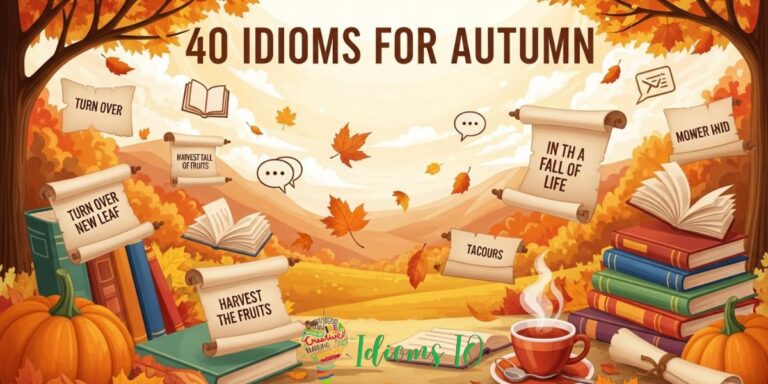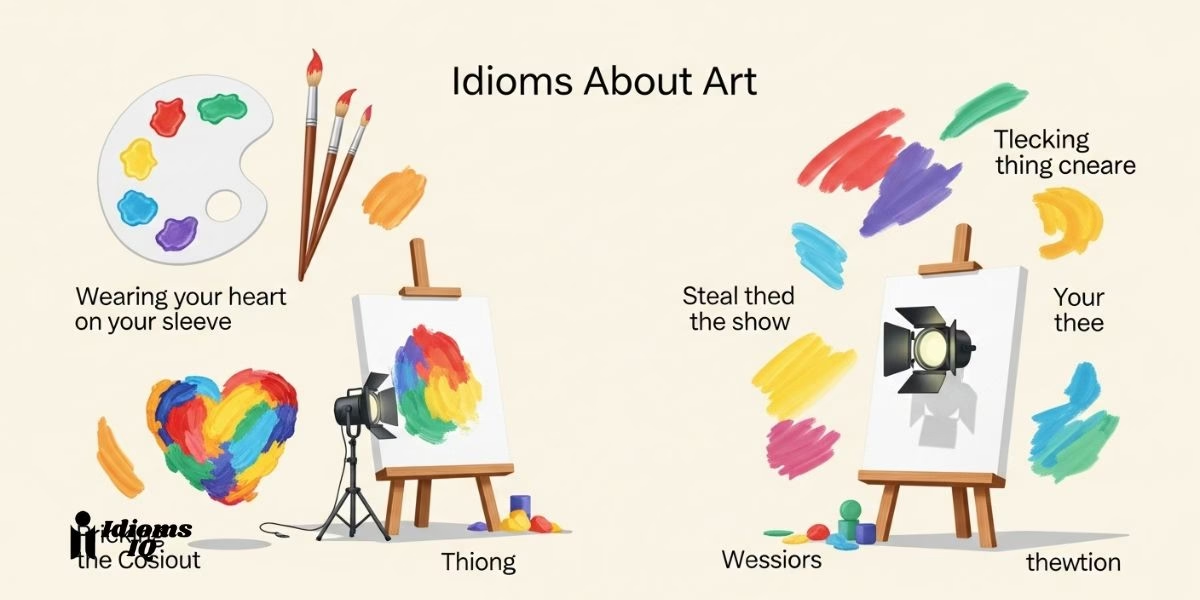
The world of art with its drama, beauty, and passion is a stage for our grandest emotions. It’s no surprise, then, that this creative world has given us a rich palette of idioms to color our everyday language. An idiom is a common phrase with a figurative meaning that isn’t obvious from the individual words.
They are the secret shortcuts of language; when you “steal the show,” you’re not actually a thief! You’ve just given an amazing performance. In our own creative expression, idioms about art add flair and a deeper layer of meaning. This article will explore 40 creative idioms from the world of art, complete with their meanings and examples, to help you express yourself with the skill of a master.
Related: Idioms for Nervousness
Why We Use Art Idioms in Language
Idioms are the personality of a language. They add character, wit, and a sense of shared culture that makes communication more vibrant. In art and literature, these idioms act as a creative shorthand for complex ideas. Describing a situation as a “blank canvas” instantly conveys a sense of fresh opportunity. These phrases make dialogue sound authentic and descriptions more imaginative, creating a strong connection with the audience through the shared, dramatic language of the arts.
Idioms About Art
Here is a gallery of idioms from visual art, music, theatre, and literature to add to your masterpiece of a vocabulary.
Visual Art Idioms (Painting, Sculpture)
1. To Paint a Picture
- Meaning: To describe a situation or story in a very vivid and detailed way.
- Usage Example: “Her letter from Venice was so descriptive, it really painted a picture of her travels.”
- This idiom is used when someone’s words create a strong mental image for the listener.
2. A Blank Canvas
- Meaning: A situation with no prior conditions, offering a fresh start and the freedom to create something new.
- Usage Example: “After quitting his old job, his future felt like a blank canvas, full of possibilities.”
- This metaphor is often used to describe new opportunities in life, work, or creative projects.
3. State of the Art
- Meaning: The most modern, advanced, and highest level of development.
- Usage Example: “The new science lab was filled with state-of-the-art equipment.”
- This phrase is used to describe cutting-edge technology, architecture, or design.
4. Down to a Fine Art
- Meaning: To have perfected a skill or task so that you can do it flawlessly and efficiently.
- Usage Example: “She has getting her three kids ready for school in the morning down to a fine art.”
- This idiom suggests that a routine or skill has been mastered with the precision of an artist.
5. As Pretty as a Picture
- Meaning: To be very beautiful, charming, or picturesque.
- Usage Example: “The little cottage by the sea, with its beautiful garden, was as pretty as a picture.”
- This is a classic compliment for a person, place, or scene that looks perfect.
6. A Picture is Worth a Thousand Words
- Meaning: A visual image can convey a complex idea or an emotional story more effectively than a long description.
- Usage Example: “He tried to describe the chaos, but the photo he showed us proved that a picture is worth a thousand words.”
- This is a famous proverb that emphasizes the power of visual communication.
7. To Watch Paint Dry
- Meaning: Something that is extremely boring and tedious.
- Usage Example: “I’d rather watch paint dry than sit through another one of his long, boring speeches.”
- This humorous idiom is used to describe an activity that is mind-numbingly dull.
8. To Put Someone in the Picture
- Meaning: To inform someone of the current situation and give them the necessary details.
- Usage Example: “Before we start the meeting, let me put you in the picture about what’s been happening.”
- This idiom uses the idea of completing a picture to mean completing someone’s understanding.
Music Idioms
9. To Face the Music
- Meaning: To accept the unpleasant consequences of your actions.
- Usage Example: “He knew he had been caught, and it was time to go home and face the music.”
- This idiom is thought to come from the military, where a soldier being dismissed would face the regimental band as he left.
10. To Play Second Fiddle
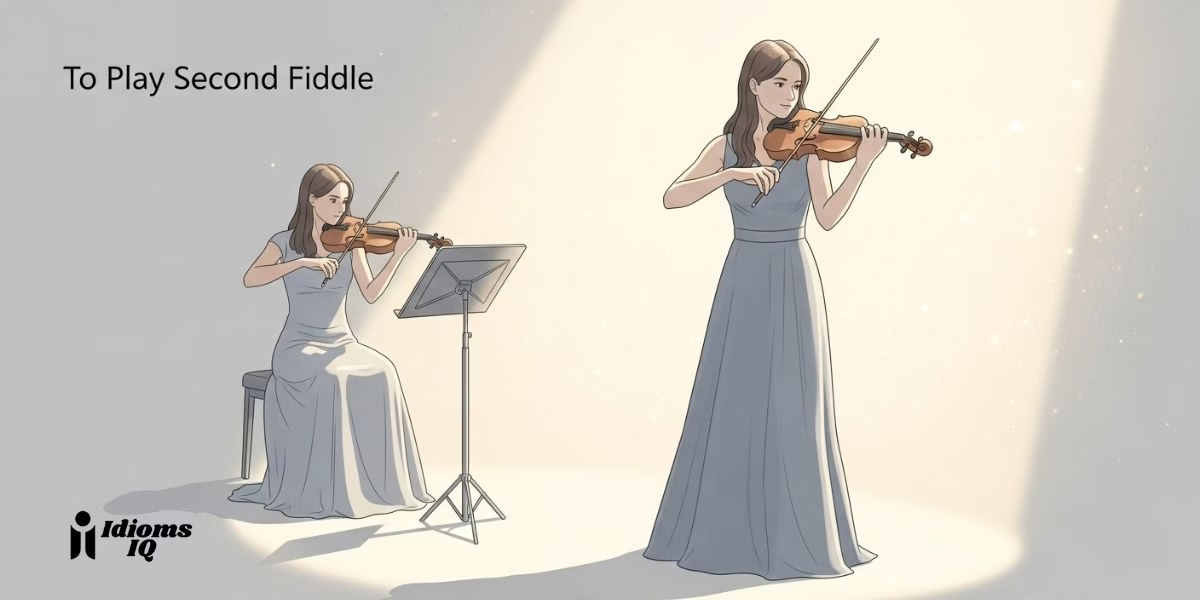
- Meaning: To be in a subordinate or less important role than someone else.
- Usage Example: “She was tired of being the vice president and playing second fiddle to the CEO.”
- This comes from an orchestra, where the “first fiddle” (violin) plays the main melody and the “second fiddle” plays a supporting part.
11. To Pull Out All the Stops
- Meaning: To use every available resource and effort to achieve something.
- Usage Example: “They pulled out all the stops for their 50th-anniversary party, and it was incredible.”
- This idiom originates from the “stops” on a pipe organ, which are pulled out to activate all pipes for the loudest possible sound.
12. To Change Your Tune
- Meaning: To change your opinion or attitude about something, often suddenly.
- Usage Example: “He used to criticize the company, but he changed his tune after they gave him a big promotion.”
- This idiom compares a change of opinion to a musician changing the song they are playing.
13. For a Song
- Meaning: To buy or sell something for a very low price.
- Usage Example: “He bought the old, run-down house for a song and renovated it himself.”
- This phrase suggests the price was so low it was almost like getting it for the price of singing a song.
14. Music to My Ears
- Meaning: News or information that is very pleasant and welcome to hear.
- Usage Example: “When she said the project was approved and fully funded, it was music to my ears.”
- This is a common and positive way to respond to good news.
15. To Strike a Chord
- Meaning: For something to resonate with you, seem familiar, or evoke a strong emotional response.
- Usage Example: “The film’s story about a lost immigrant really struck a chord with me.”
- This idiom uses the musical concept of a chord to describe an emotional connection.
16. To Play It by Ear
- Meaning: To decide how to handle a situation as it unfolds, without a fixed plan.
- Usage Example: “We don’t have a set itinerary for our trip; we’re just going to play it by ear.”
- This phrase comes from a musician’s ability to play a piece of music after hearing it, without sheet music.
Theatre & Drama Idioms
17. To Steal the Show
- Meaning: To become the main focus of attention and praise, often unexpectedly, surpassing the main performers.
- Usage Example: “The star of the movie was great, but the little-known supporting actor completely stole the show.”
- This is a common phrase used in reviews of plays, movies, and performances.
18. A Drama Queen
- Meaning: A person who consistently overreacts to situations in a very theatrical and emotional way.
- Usage Example: “He stubbed his toe and acted like he needed to go to the hospital. He’s such a drama queen.”
- This is an informal and often critical term for someone who exaggerates their emotions for attention.
19. To Be in the Limelight
- Meaning: To be the center of public attention and media interest.
- Usage Example: “As a famous actress, she was used to living her life in the limelight.”
- This idiom comes from the early days of stage lighting, which used a block of lime to create a bright, focused light on the main actor.
20. Break a Leg
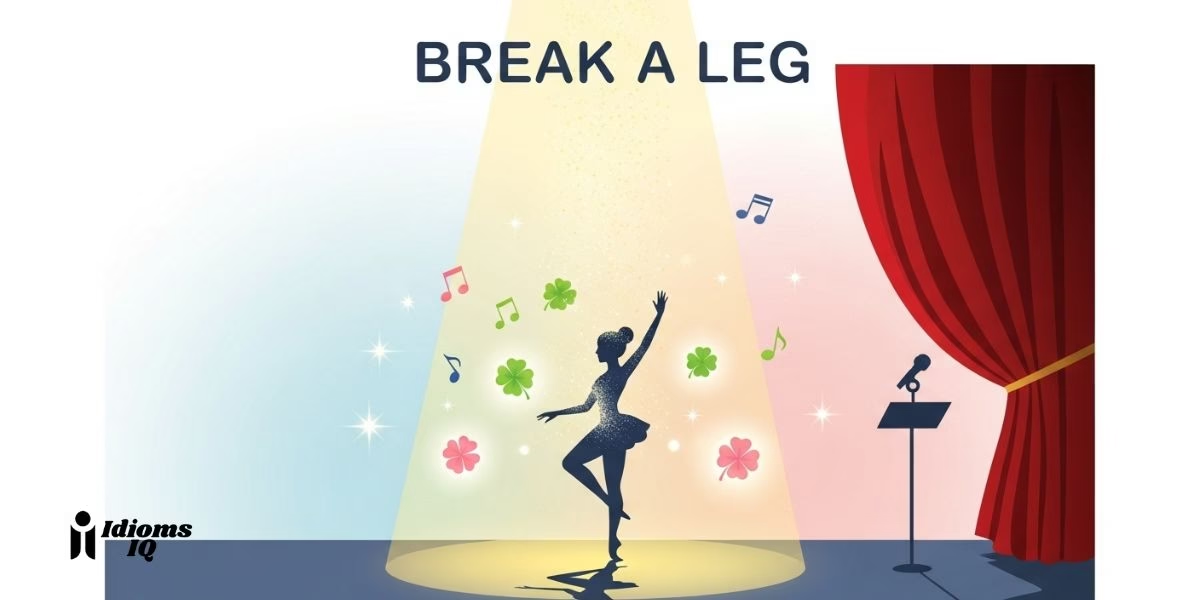
- Meaning: A superstitious way to say “good luck” to a performer before they go on stage.
- Usage Example: “Just before she went on stage for her solo, her castmates whispered, ‘Break a leg!'”
- Saying “good luck” is considered bad luck in the theatre, so this idiom is used instead.
21. The Show Must Go On
- Meaning: A saying that means a performance or event must continue, even if problems or difficulties arise.
- Usage Example: “Even though the lead singer was sick, the band knew the show must go on.”
- This is a classic motto in the entertainment industry that emphasizes professionalism and resilience.
22. To Get Your Act Together
- Meaning: To organize yourself and start behaving more effectively or responsibly.
- Usage Example: “If you want to pass this class, you need to get your act together and start studying.”
- This idiom uses the idea of a performer preparing their “act” to mean preparing for life’s challenges.
23. To Be Waiting in the Wings
- Meaning: To be ready and waiting for an opportunity to take over or become active.
- Usage Example: “The vice president is waiting in the wings to take over the company when the CEO retires.”
- This refers to the area at the side of a stage (the “wings”) where actors wait before making their entrance.
Literary Idioms
24. Poetic Justice
- Meaning: A fitting and ironic outcome in which virtue is rewarded and vice is punished, often in a way that is cleverly appropriate.
- Usage Example: “It was poetic justice when the corrupt politician who took bribes was brought down by an accountant who refused to be bribed.”
- This literary concept is often used to describe a satisfying real-life conclusion to a story.
25. A Closed Book
- Meaning: A person or subject that is very difficult to know or understand.
- Usage Example: “He’s a very private person; his personal life is a closed book to his colleagues.”
- This idiom compares a person’s personality to a book that cannot be opened and read.
26. To Read Someone Like a Book
- Meaning: To understand someone’s thoughts and feelings very easily.
- Usage Example: “She knew he was lying; after 20 years of marriage, she could read him like a book.”
- This is the opposite of a “closed book” and implies deep familiarity and intuition.
27. To Be on the Same Page
- Meaning: To be in agreement or to have a shared understanding of a situation.
- Usage Example: “Before we present this to the client, let’s make sure we’re all on the same page about the strategy.”
- This idiom uses the image of two people reading from the same page in a book or script.
28. Don’t Judge a Book by Its Cover
- Meaning: You shouldn’t form an opinion about someone or something based on its outward appearance alone.
- Usage Example: “He looked very serious, but he was actually very funny. It just shows you shouldn’t judge a book by its cover.”
- This is a very common proverb that advises looking beyond superficial appearances.
29. To Turn Over a New Leaf
- Meaning: To start behaving in a better or more responsible way; to make a fresh start.
- Usage Example: “After getting out of trouble, he promised to turn over a new leaf and focus on his studies.”
- This idiom refers to turning the “leaf” or page of a book to begin a new section.
30. To Take a Leaf Out of Someone’s Book
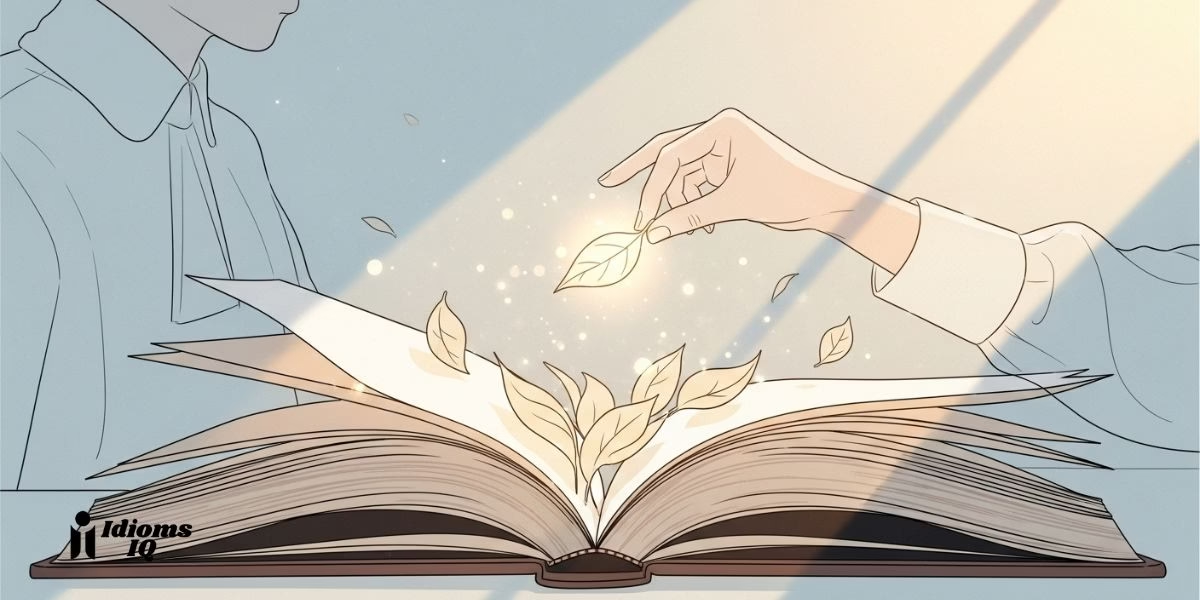
- Meaning: To imitate or follow the example of someone you admire.
- Usage Example: “She is so successful and organized. I should really take a leaf out of her book.”
- This idiom suggests copying a “page” from someone else’s successful life story.
31. To Ring a Bell
- Meaning: For something to sound vaguely familiar to you, but you can’t remember the exact details.
- Usage Example: “I’m not sure if I’ve met him before, but his name does ring a bell.”
- This musical idiom compares the triggering of a faint memory to the clear, simple sound of a bell ringing.
32. To Blow Your Own Trumpet
- Meaning: To boast or brag about your own achievements and talents.
- Usage Example: “He’s very talented, but he has a tendency to blow his own trumpet, which can be off-putting.”
- This idiom comes from the medieval practice of heralds blowing trumpets to announce the arrival of someone important.
33. It’s Not Over Until the Fat Lady Sings
- Meaning: A situation is not finished and the outcome is still uncertain until the very final moment.
- Usage Example: “Our team was losing by 20 points, but it’s not over until the fat lady sings, and they made an amazing comeback.”
- This humorous idiom originates from the world of opera, where the final, dramatic aria is often sung by a large soprano character.
34. By the Book
- Meaning: To do something strictly according to the rules, laws, or established procedures.
- Usage Example: “She is a very precise accountant who does everything by the book.”
- This literary idiom compares the official rules to a text or book that must be followed exactly.
35. All That Jazz
- Meaning: All the other similar, related, or predictable things; and so on.
- Usage Example: “He told me about his new job, his promotion, his new car, and all that jazz.”
- This idiom, popularized by a song from the musical Chicago, is a casual way to summarize a list of related items.
36. To Strike the Right Note
- Meaning: To say or do something that is perfectly suited to the occasion and is well-received.
- Usage Example: “His speech at the funeral struck the right note; it was sad but also hopeful.”
- This musical idiom compares a well-chosen comment or action to a musician playing a note that is in perfect harmony.
37. To Fine-Tune
- Meaning: To make small and precise adjustments to something in order to perfect it or make it more effective.
- Usage Example: “The car is running well, but the mechanic wants to fine-tune the engine to get the best performance.”
- This phrase comes from the process of tuning a musical instrument to get the pitch exactly right.
38. Picture Perfect
- Meaning: Absolutely flawless, beautiful, and ideal, as if it were a perfect photograph.
- Usage Example: “With the white sandy beach and the clear blue water, the scene was picture perfect.”
- This visual idiom is used to describe a scene, moment, or person that appears flawless.
39. To Set the Stage For
- Meaning: To create the necessary conditions for a future event to happen.
- Usage Example: “The peace talks are intended to set the stage for a lasting agreement between the two countries.”
- This theatrical idiom compares preparing for a future event to setting up the scenery on a stage before a play begins.
40. To Paint the Town Red
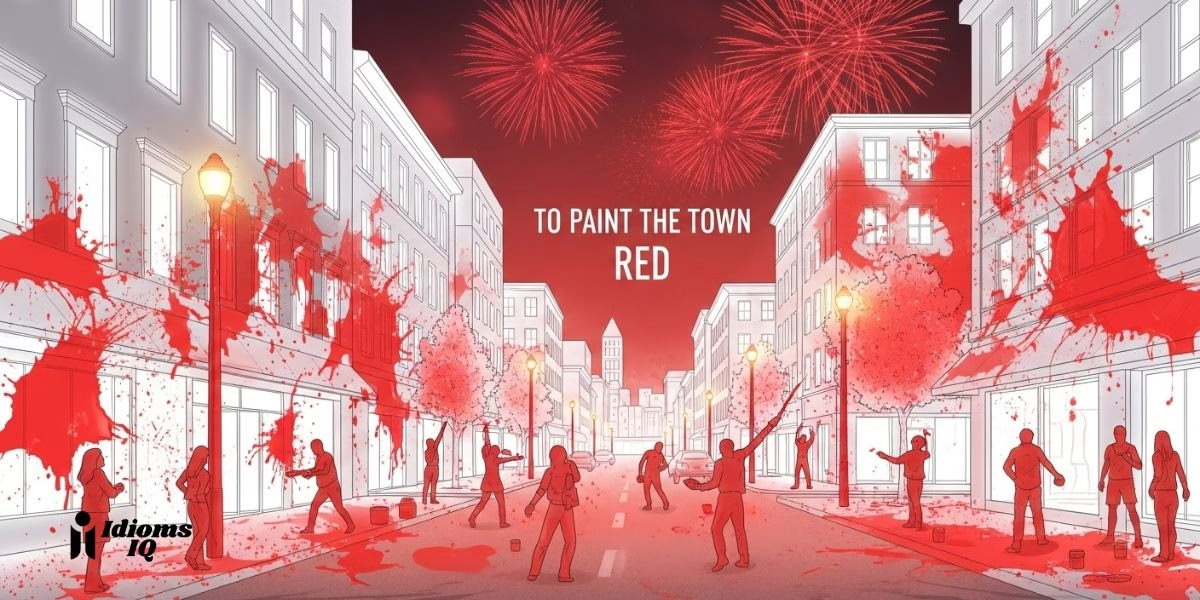
- Meaning: To go out and celebrate in a lively, exuberant, and often wild way.
- Usage Example: “After their final exams were over, the students went out to paint the town red.”
- While its exact origin is debated, this idiom evokes an image of creating a scene as colourful and chaotic as a wild painting.
Practice Your New Vocabulary: Fill in the blanks
Ready for your debut? Fill in the blanks with the best idiom from the list.
- The lead actor was good, but the newcomer completely ________________ with her amazing performance.
- I’m sorry, that name doesn’t ________________. Do I know them?
- We need to make sure the whole team is ________________ before we move forward.
- His description of the island was so vivid it ________________ in my mind.
- After he got caught lying, he had to go home and ________________.
- She was so happy to get the job offer; the good news was ________________.
- The new smart phone has all the latest features; it’s completely ________________.
- I don’t have a specific plan for the meeting; I’ll just ________________.
- Don’t be such a ________________; spilling a little coffee is not the end of the world.
- Before the main event, the opening band’s job is to ________________ for the headliner.
Answers
- stole the show
- ring a bell
- on the same page
- painted a picture
- face the music
- music to my ears
- state of the art
- play it by ear
- drama queen
- set the stage
Conclusion
The language of art is the language of life. The idioms from the worlds of painting, music, theatre, and literature enrich our daily conversations, allowing us to express ourselves with more drama, color, and creativity.
By understanding and using these expressions, you can make your language more dynamic and insightful, connecting with others through a shared appreciation for the arts. We encourage you to listen for these phrases and not be afraid to take center stage in using them yourself.




